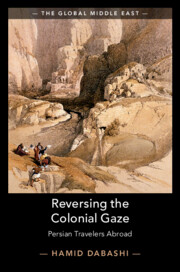Book contents
- Reversing the Colonial Gaze
- The Global Middle East
- Reversing the Colonial Gaze
- Copyright page
- Dedication
- Contents
- Figures
- Preface
- Acknowledgments
- Introduction
- 1 Mr. Shushtari Travels to India
- 2 Mirza Abu Taleb Travels from India
- 3 An Ilchi Wonders about the World
- 4 A Colonial Officer Is Turned Upside-Down
- 5 A Shirazi Shares His Travelogues
- 6 A Wandering Monarch
- 7 Hajj Sayyah Leads a Peripatetic Life
- 8 In the Company of a Refined Prince
- 9 A Wandering Mystic
- 10 In and out of a Homeland
- 11 The Fact and Fiction of a Homeland
- 12 Professor Sayyah Comes Home to Teach
- Conclusion
- Index
12 - Professor Sayyah Comes Home to Teach
Published online by Cambridge University Press: 19 December 2019
- Reversing the Colonial Gaze
- The Global Middle East
- Reversing the Colonial Gaze
- Copyright page
- Dedication
- Contents
- Figures
- Preface
- Acknowledgments
- Introduction
- 1 Mr. Shushtari Travels to India
- 2 Mirza Abu Taleb Travels from India
- 3 An Ilchi Wonders about the World
- 4 A Colonial Officer Is Turned Upside-Down
- 5 A Shirazi Shares His Travelogues
- 6 A Wandering Monarch
- 7 Hajj Sayyah Leads a Peripatetic Life
- 8 In the Company of a Refined Prince
- 9 A Wandering Mystic
- 10 In and out of a Homeland
- 11 The Fact and Fiction of a Homeland
- 12 Professor Sayyah Comes Home to Teach
- Conclusion
- Index
Summary
In Chapter 12, “Professor Sayyah Comes Home to Teach,” I look closely at Fatemeh Sayyah’s life and career (1902–1948). Fatemeh Sayyah (aka Fatemeh Reza Zadeh Mahallati) did not write a travelogue, but her life and literary career are emblematic of a peripatetic environment that had made her professional character and literary culture possible. She was related to Hajj Sayyah, whose travelogue I examine in Chapter 7, and was briefly married to his son Hamid Sayyah, from whom she received her last name. Her father was a professor of Persian literature in Russia, and her mother was Russian, of German descent. She was born and raised in Moscow, received her early and advanced education in Russia, mastered Russian and French literatures, received her doctorate degree in comparative literature with a dissertation on Anatole France, and then traveled to her homeland in 1924 and was a pioneering figure in introducing the discipline of comparative literature to Iranians. What is important about Fatemeh Sayyah is the fact that she was born and raised outside Iran, received her higher education in Russia, was far more comfortable in Russian than in Persian, assumed a leading role in the women’s rights movement in her homeland, and traveled extensively abroad to represent Iran in various conferences, and thus best personifies the multifaceted cosmopolitan culture that had deeply informed the entire body of travelogues I examine in this book. But, and there is the rub, that personification was marked by a positivist Eurocentricity that went against the grain of the world travelers who had made her possible. In that paradoxical twist we will see the emotive split between the unwavering sovereignty of a nation and the vagaries of states that have sought to rule them.
Keywords
- Type
- Chapter
- Information
- Reversing the Colonial GazePersian Travelers Abroad, pp. 336 - 360Publisher: Cambridge University PressPrint publication year: 2020

